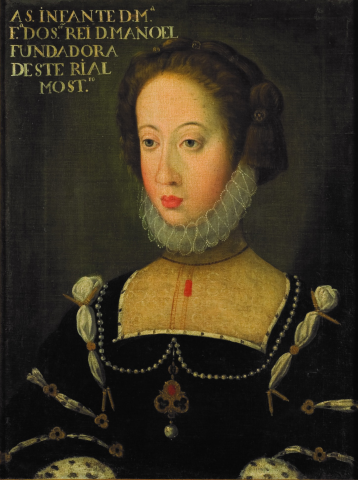Ad Mariam Ungāriae et Bohēmiae Rēgīnam Augustissimam
[1] Audāciae prōrsus adscrībendum, fateor, cum ad Maiestātem tuam scrībam, cum pulvis sim et cinis, nī mē ad hoc tua in bonārum artium professōrēs mīra benignitās impelleret, quae omnem penitus tantae celsitūdinis stupōrem, velutī tenuissimam nebulam, hūmānitātis sōle dissipat ac resolvit, praesertim cum ā Maiestātis tuae oeconomō audierim mentiōnem dē mē facere tē nōn dēdignātam, quīn iubēre ut ad tuī obsequium remeārem, sī lubēret, ac rēgiā fide prōmittere mihi meōque coniugī praemia digna redditūram.
[2] Habeō itaque immortālēs prō tantō dōnō Maiestātī tuae grātiās, ac doleō quod nōn ab ipsīs incūnābulīs meōrum studiōrum prōventūs omnēs ac vigiliās tibi sōlum dēvōverim, tibi inquam, quae orbis moderāmen ob dīvīnī animī tuī dōtēs, rēgiae Celsitūdinis, adeō cōnsimilēs sōla inter mortālēs prōmerēris. [3] Sōlātur mē tamen quod brevī futūrum, spērō ut Maiestātis tuae pedibus prōvolvar, cum ad vōs mea vēnerit Prīnceps, eōque temporis quod dē mē meōque coniuge tua sānxerit Maiestās, facilius erit adimplēre, dum tamen interim id sibi velit tua Celsitūdō persuādēre, nihil aliud quam tibi obsequium aliquod, quoad vīxerō, impendere, mihi posse ēvenīre dulcius, nihilque fēlīcius.
[4] Vīvat igitur tua Maiestās ut doctōs omnēs foveat, bonāsque artēs ad astra tollat, quae sōla potest. Burgīs annō 1557.
Tuae Maiestātis pedibus prōvolūta.
L.S.
notes
Luisa Sigaea has heard that Queen Mary of Hungary, governor of the Netherlands (now in retirement in Castile) has extended an offer of patronage and support to herself and her husband, an offer she gratefully accepts.
[1] Mariam Ungāriae: Mary of Hungary (1505-1558). Sister of Emperor Charles V, she governed the Netherlands in his stead from 1531-1555. At the time of this letter (1557) she had retired to Castile, where she died the following year. Mary was a notable patron of the arts, especially painting and music.
Bohēmiae Rēgīnam Augustissimam: in apposition with Mariam. In 1515, at the age of 10, Mary married King Louis II of Hungary and Bohemia. He died in 1526, and Mary governed Hungary as regent in the name of the new king, her brother, Ferdinand I, until 1530.
prorsus: "quite," "absolutely," emphasizing audaciae.
adscribendum: "it must be attributed" + dative audaciae, "to (my) boldness."
fateor: "I confess."
cum ... scribam: causal, "since I am writing."
Maiestatem: she addresses Mary as "your Majesty" throughout the letter.
cum ... cinis: concessive, "although I am (mere) dust and ash," an allusion to Genesis in the Latin Vulgate version: 18:27, cum sim pulvis et cinis. In that context Abraham is speaking to the Lord. In the New International Version: "Now that I have been so bold as to speak to the Lord, though I am nothing but dust and ashes...."
nī: = nisi, "unless," "if ... not," looking forward to impelleret, impf. subj. in a present contrary-to-fact condition.
hoc: the action of writing to Maria.
in ... professōrēs: "towards practitioners."
bonārum artium: the liberal arts, scholarship, the arts. During her time in the Netherlands Maria was a notable patron of the arts, especially of music.
impelleret: "(were it not) urging on," imperfect subjunctive in a present contrary-to-fact condition after nī.
quae ... dissipat ac resolvit: benignitas is the antecedent.
omnem ... stupōrem: "all awe of" (+ gen.), direct object of dissipat ac resolvit.
penitus: adverbial, “thoroughly.”
celsitūdinis: "exalted rank" "high status." Alternately, this might be capitalized and taken as a title, "your Highness," as it clearly is below. Objective genitive after stupōrem.
tenuissimam nebulam: "an insubstantial cloud," metaphorically compared with stupōrem, as sōle is equated with humanitas. velutī, "as if," introduces the simile.
hūmānitātis: humanitās connotes both humane sympathy and cultured refinement, virtues especially admired in the powerful.
praesertim cum ... audierim: causal, "especially since I heard."
Maiestatis: Mary of Hungary.
oeconomō: steward, manager of estates.
tē nōn dedignātam: supply esse with te as the subject in indirect discourse after audierim: "(I heard) that you deigned to," "that you did not disdain to," followed by the complementary infinitive facere.
quīn: an adverb extending and amplifying what precedes: "indeed," "in fact ..."
iubēre ... ac ... promittere: indirect statement continues after audierim: "that you ordered ... and promised."
ad tuī obsequium: “to your service.” tuī is objective genitive.
sī lubēret: impersonal > libet or lubet, "if it were pleasing (to me)," "if I wished."
regiā fide: ablative of manner, "with royal good faith." Describes the way in which she promised.
redditūram: supply esse, "that you would grant," "pay," (LS reddo II.1).
coniugī: Francisco de Cuevas, a nobleman from Burgos. They married in 1552. Both he and Luisa wanted to work in Mary of Hungary's court. As Sigaea says in later letter (#17, to King Philip II, 1559) Mary did in fact employ and support both spouses until her death (in 1558): "him she employed as a privy councilor (ā secrētīs), me as a scholar (ā studiīs) among her noble women" (Bourdon and Sauvage 1970: 116).
[2] Habeō ... immortālēs ... gratiās: "I express my undying thankfulness" (LS gratia II.B).
doleō quod: "I am sorry that," governing devoverim.
quod nōn ... dēvōverim: "that I did not devote," perfect subjunctive, though the indicative would be more normal giving a reason vouched for by the speaker (AG 540).
proventūs: "harvest," "produce," i.e. written works as well as informal teaching and scholarly assistance. The metaphor is agricultural.
vigiliās: "periods of wakefulness (while others sleep)," i.e. dedicated literary and scholarly labor.
tibi solum: "only to you," “to you alone.”
tibi, inquam: emphatic repetition of the pronoun. inquam is parenthetical.
orbis moderāmen: "government of the world." Maria had very significant and difficult governing responsibilities as regent of the Netherlands.
ob ... dotēs: "because of the gifts," "due to the talents" (LS dōs II).
adeō: "(so) very much," emphasizing promerēris.
cōnsimilēs sōla inter mortālēs: inter is postponed, and governs consimilēs mortālēs, "similar mortals," i.e. other monarchs.
[3] Sōlātur mē: impersonal, "it consoles me," "I feel better."
brevī: supply tempore, "soon."
futūrum ... ut: impersonal, "it will come about that," i.e. "I may," (LS sum I.B.5.b) followed by subj. in a result clause, provolvar.
prōvolvar: reflexive or passive with a middle sense, "prostrate myself before," "fall down at" + dat. (OLD provolvo 3.a).
cum ... vēnerit: fut. pf. indicative in a temporal cum-clause, denoting future time (AG 547).
mea ... Princeps: Maria of Portugal, Duchess of Viseu, in whose court Luisa was working at this time. Maria of Portugal was planning a visit to Spain to see her mother, Leonor.
eōque temporis: “and at that time,” lit. “and in that (moment) of time.”
quod dē mē ... adimplēre: order: facilius erit adimplēre (id) quod tua Maiestās sānxerit dē mē meōque coniuge.
sānxerit: "will have decreed," "shall ordain," fut. pf. indic.
dum tamen interim: dum introduces a proviso clause, “Provided that in the meantime, however.”
id sibi ... persuādēre: order: tua Celsitūdō velit id sibi persuādēre, “Your Highness might be willing to persuade herself this,” i.e. be willing to believe this. Id is emphatic and looks forward to the following clause. The reflexive with persuadeō is normal (LS persuadeo II).
velit: subj. in a clause of proviso (AG 528).
nihil aliud ... felīcius: order: nihil aliud dulcius nihilque felicius posse evenīre mihi quam impendere aliquod obsequium tibi, quoad vīxerō.
nihil aliud: "no other thing," "nothing else," "nothing."
quam impendere: "than to devote." obsequium aliquod is the direct object.
vīxerō: fut. pf. indic. > vivo.
[4] vivat: jussive subjunctive, introducing the purpose clauses ut … foveat ... tollat.
foveat: “foster," "nurture," through financial and other support.
bonās ... artēs: "the liberal arts," literature, scholarship, etc.
tollat: "exalt," in status, promote.
quae: Mary of Hungary (tua Maiestās) is the antecedent.
sola: a flattering hyperbole.
Burgīs: "(written) at Burgos," in Spain, Luisa's husband's home city. Locative (AG 427.3)
pedibus prōvolūta: "prostrate at the feet,” LS provolvo I.B + dat.
vocabulary
Marīa –ae f.: Maria
Ungaria -ae f.: Hungary
Bohemia -ae f.: Bohemia
rēgīna rēgīnae f.: queen
augustus –a –um: revered
audācia audāciae f.: boldness
prōrsus: quite, absolutely
ascrībō (adscr–) ascrībere ascrīpsī ascrīptum: to attribute to (+ dat)
māiestās –ātis f.: majesty
pulvis pulveris m.: dust
professōr professōris m.: teacher, practitioner, professor
mīrus –a –um: marvelous, wonderful
benignitās –ātis f.: kindness
impellō impellere impulī impulsum: impel
penitus or penitē: entirely, deeply
celsitūdō –inis f.: highness
stupor –oris m.: awe
tenuis tenue: thin
nebula –ae f.: cloud
hūmānitās hūmānitātis f.: humanity
dissipō –āre: to scatter, disperse
resolvō –ere –solvī –solūtus: to untie, dissolve
praesertim: especially
oeconomus -ī m.: steward
mentiō mentiōnis f.: mention
dēdignor –ārī: to refuse scornfully
obsequium –ī n.: service
remeō remeāre remeāvī remeātus: to go back
immortālis immortālis immortāle: immortal 2
māiestās –ātis f.: greatness; majesty
incūnābula –ōrum n.: a cradle; the beginnings
prōventus –ūs m.: a produce, yield
vigilia vigiliae f.: periods of wakefulness (while others sleep); vigilance
dēvoveō dēvovēre dēvōvī dēvōtus: to dedicate
moderāmen –inis n.: government
dīvīnus –a –um: divine
dōs dōtis f.: gift, endowment; dowry
rēgius -a -um: royal
celsitūdō –inis f.: highness
cōnsimilis –e: entirely similar, like
prōmereor –meritus sum: to merit for one's self by favors given; deserve
sōlor –ātus sum: to console 3
prōvolvō –ere –volvī –volūtus: prostrate oneself before, fall down at (+ dat.)
sanciō sancīre sānxī sānctus: to consecrate
adimpleō adimplēre –ēvī –ētum: to fill up with, fulfill
persuādeō persuādēre persuāsī persuāsus: to persuade
obsequium –ī n.: service
quoad: as long as
impendō –pendere –pendī –pēnsum: to expend
ēveniō ēvenīre ēvēnī ēventus: to come out, happen, turn out
māiestās –ātis f.: greatness; majesty 4
doctus –a –um: taught, learned, skilled
foveō fovēre fōvī fōtus: to cherish, foster, nurture
Burgae -ārum f. pl.: Burgos, in Spain
māiestās –ātis f.: greatness; majesty
prōvolvō –ere –volvī –volūtus: prostrate oneself before, fall down at (+ dat.)



